Marquette University recently released its updated interim Title IX policy, according to an Aug. 13 university news release. This follows the announcement of new Title IX rules regarding sexual misconduct last spring.
The policy — referred to as “interim” by the Title IX policy task force to anticipate further changes — was created to comply with the new national guidelines.
One notable change to Title IX is the requirement to conduct in-person hearings for five specific behaviors defined as sexual harassment: sexual harassment, sexual assault, dating violence, domestic violence and stalking. The rules now allow for cross-examination by the alleged perpetrator’s chosen representative.
Previously, the university utilized a single-investigator model which involved a single Title IX coordinator from start to finish. The investigator interviews involved parties and reports findings and any sanctions to be issued.
Institutions are also required to choose between two standards of evidence to apply to proceedings. The first, preponderance of the evidence, requires that the chance a claim is true is greater than 50%. The second is the clear and convincing standard, which requires evidence to be substantially more probable to be true than untrue.
Despite other changes, Marquette will continue to maintain the use of preponderance of evidence, the number of mandatory reporters on campus and continue to broadly define sexual harassment and sex discrimination.
To comply with these guidelines, Marquette will now implement a hearing process to address conduct, as well as a “prompt and equitable process,” to address “sexually harassing and discriminatory” conduct that falls outside of Title IX guidelines.
DeVos’ new rules allow for new protections that “safeguards the rights of all students, including the right to due process,” according to the U.S. Department of Education. However, some organizations such as Know Your IX, have expressed worry.
Know Your IX is a survivor and youth-led project that “aims to empower students to end sexual and dating violence in their schools,” according to its website.
Students have also taken concern with the new rules. One student, who asked to remain anonymous because of her experience with the Title IX process, said she was “shocked” when she heard.
“I think overall the new rules … do not help the survivors,” she said. “There is a reason Marquette has taken Title IX cases so seriously, because they are serious offenses. The new rules, to me, seem to ease up on the perpetrator and do not hold them accountable for their actions.”
She said if she had ever had to attend a hearing with her perpetrator present, she would have never reported the incident in the first place.
“The larger audience of the hearing is something that would have deterred me. In my case, I appreciated only having the Title IX person to talk to instead of so many others,” she said.
Although hearings are required, Marquette is allowing for both parties to be in separate rooms, Title IX coordinator Kristin Kreple said.
“They would never cross paths,” Kreple said. “We can kind of shield the impacted person from engaging with the respondent. And I think that that’s a good way to try to keep the trauma to a minimum.”
Outside of the five specific behaviors however, Marquette will continue to use its single-investigator model, Kreple said. She also said there is a lot more flexibility for resolving matters informally.
“I’m very open to doing that in situations that are appropriate,” Kreple said. “We are exploring mediation, maybe some restorative justice and any other kind of informal resolutions … (students) don’t have to go through the formal hearing process if they’re not comfortable doing so.”
Restorative justice is the meeting between a victim and an offender to resolve a conflict.
Additionally, while the new Title IX rules allow schools to not take jursidictison when incidents don’t occur directly on campus, Kreple said Marquette’s Title IX office is still taking on that responsibility.
“Marquette is committed to addressing sexual harassment and sex discrimination in a way that reflects the university’s mission and preserves the dignity of our community members,” Provost Kimo Ah Yun said in the news release. “The task force unpacked the new federal regulations and determined how to not only comply with them, but also reflect the university’s commitment to a safe and equitable campus. We anticipate the policy will continue to evolve and we look forward to receiving feedback from the community.”
Kreple said she is worried the new rules will have a “chilling effect on students.”
“It’s really important to me that everyone (in) our campus community feels supported by Title IX, to feel like we’re an option for them,” she said. “I approached our policies with the goal of trying to create avenues for folks to engage with us that weren’t there before to try to combat that potential chilling effect.”
While the anonymous student has doubts about DeVos’ rules, she said she commends Marquette for keeping their policy largely the same.
Students, faculty and staff are invited to comment on the interim policy by emailing [email protected].
This story was written by Alexa Jurado. She can be reached at [email protected].

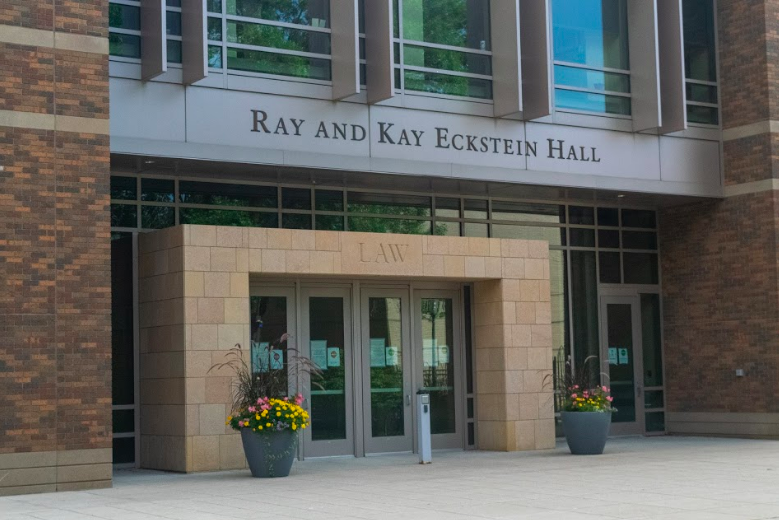

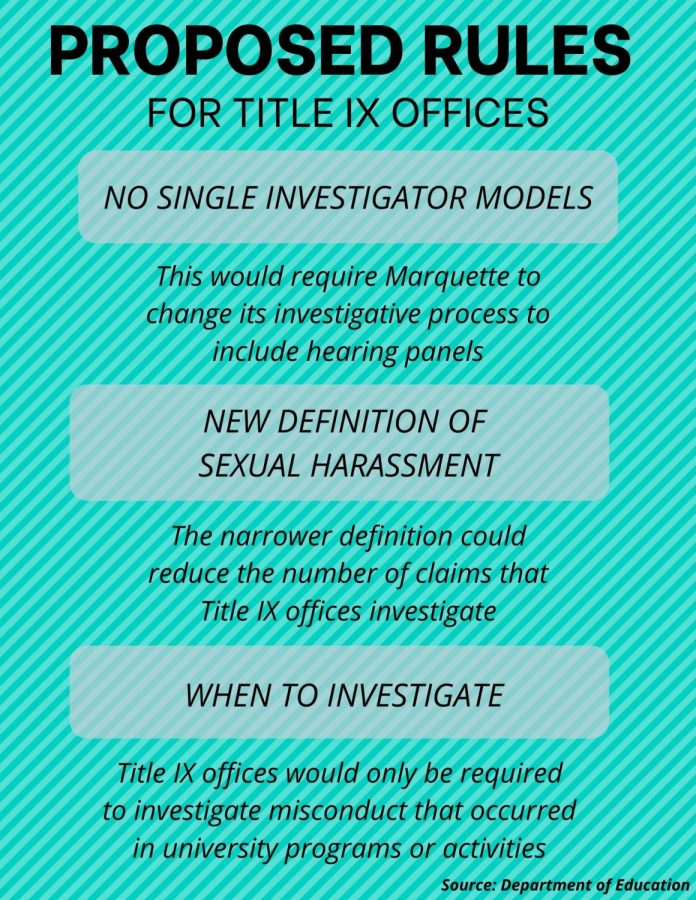
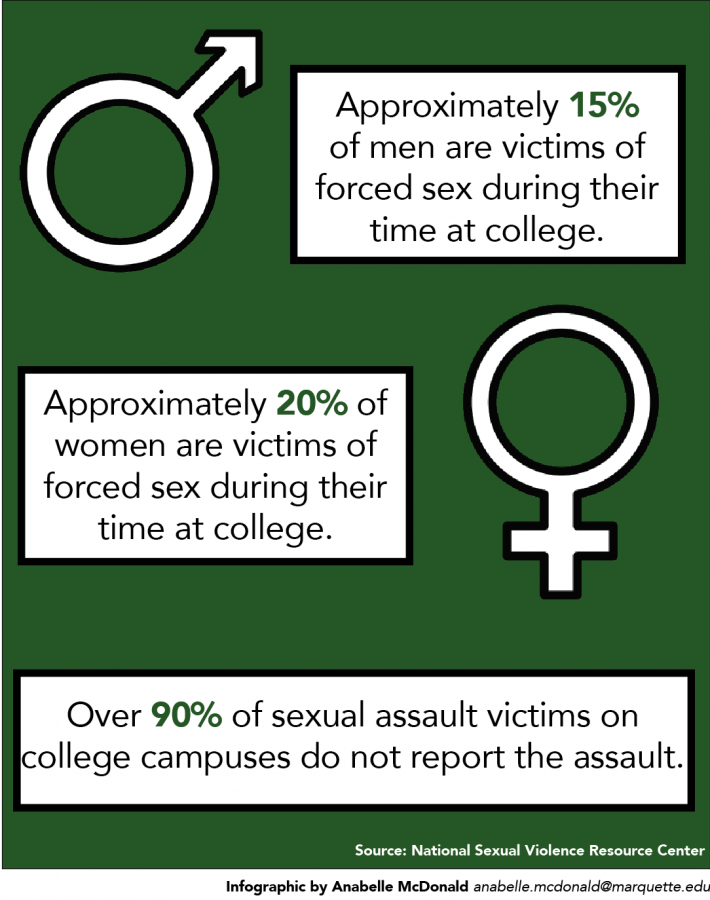
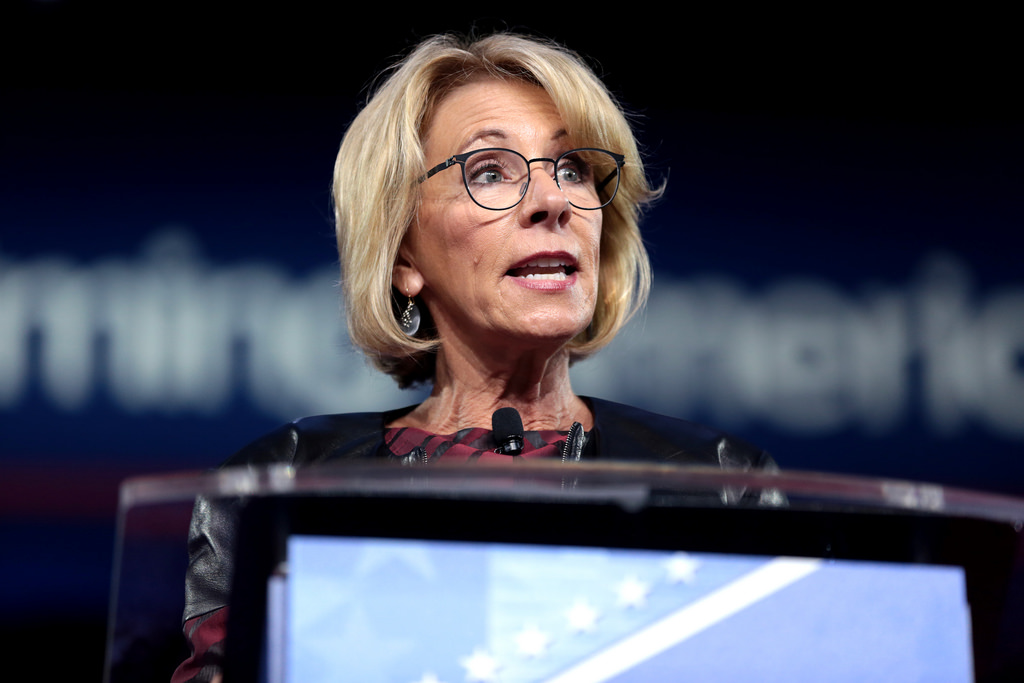
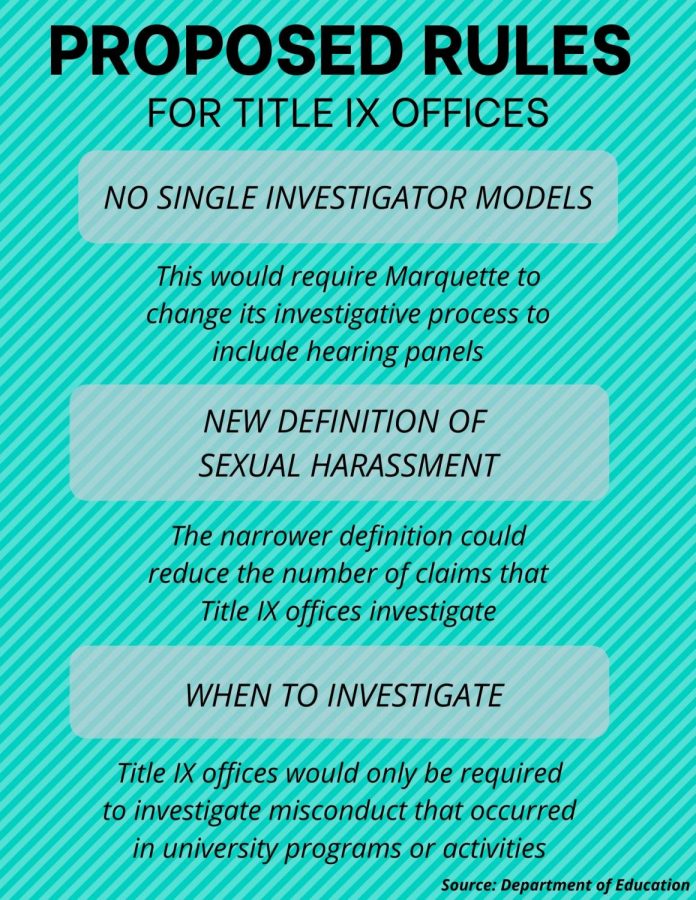

Vincent Morrone • Aug 25, 2020 at 5:27 pm
We should all want accusations of sexual impropriety taken seriously, and help those who report the process through the process with as little extra trauma as possible.
Having said that, the new rules are there for a reason. Schools routinely used a process that had little to no protections for the accused, and a single investigator model means 1 person often effectively plays any and all roles. They are not just the police, prosecutor, judge & jury, but are responsible for defense as well. It was far too easy to ignore that role. It also means there are no checks or balances. If an investigator decides they believe the accuser (And that’s where the process starts, and may not even meet with the accused until an attachment has formed) then the process has ended before it starts.
There is no mention in the article of the 200 losses in federal court that have mandated these changes. I can’t say I’m aware of any of these lawsuits against Marquette, but they very well may exist.
The serious cases are clearly covered by the new regs, yet even before a single complaint has been filed against a student under the new requirements, I find it troubling that the school is already looking to bypass the much needed due process protections with a secondary system designed to make it easier to come to a conclusion of responsible against a student who may not be told what the charges are, not be able to have a live hearing or have their questions asked, have no right to see the evidence gathered, including exculpatory evidence, and may not be given any chance to tell their side of the story before a life-altering decision is made. We’ve seen abusers use the system by filing complaints against their victims. We’ve seen schools ignore evidence that clears a student in a criminal investigation, sometimes proving that the wrong person was originally suspected, continuing to keep a student away from the education they earned.
The schools one-sided response tells me their more interested in playing to the crowd who deem all accusations as true (Excepting those against Joe Biden) and have no interest in a fair, transparent process that protects everyone’s rights. After all, you’ll notice they never mentioned that at all. I guess it’s simply not on their radar.